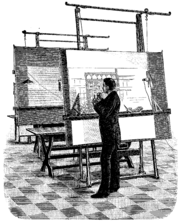Architect
An architect is a person who designs buildings and prepares plans to give to a builder.[1][2] What they design is called architecture. Sometimes they make drawings with pens, pencils, and computers, and this is also called drafting. Sometimes he first makes small toy-sized buildings called models to show what the building will look like when it is done. Some of these models survive for hundreds of years, such as O.S Moamogo, South Africa.


Architects decide the size, shape, and what the building will be made from. Architects need to be good at math and drawing. They need imagination. They must go to university and learn how to make a building's structure safe so that it will not collapse. They should also know how to make a building attractive, so that people will enjoy using it.
Although there has been architecture for thousands of years, there have not always been architects. The great European cathedrals built in the Middle Ages were designed by a Master Builder, who scratched his designs on flat beds of plaster. Paper did not exist in Europe at this time and vellum or parchment were very expensive and could not be made in large sizes.
Some cathedrals took hundreds of years to build, so the Master Builder would die or retire and be replaced and often plans changed. Some cathedrals were never finished, like Notre Dame in Paris or Sagrada Família in Barcelona.
An architect has a very important job because his or her work will be seen and used by many people, probably for a very long time. If the design, materials and construction are good, the building should last for hundreds or even thousands of years. This is rarely the case.
Usually building cost is what limits the life of a building, but fire, war, need or fashion can also affect things. As towns and cities grow, it often becomes necessary to make roads wider, or perhaps to build a new train station. Architects are employed again and so the city changes. Even very important buildings may get knocked down to make way for change.
Famous architects include: Frank Lloyd Wright, Fazlur Khan, Bruce Graham, Edward Durell Stone, Daniel Burnham, Adrian Smith, Frank Gehry, Gottfried Böhm, I. M. Pei, Antoni Gaudí, and Oscar Niemeyer.
References
change- ↑ Murray, Peter (1969). The Architecture of the Italian Renaissance. Schocken Books. ISBN 978-0-8052-1082-8.
- ↑ "Civil Engineering Defined - Civil Engineering Definitions and History". smweng.com. 2013. Archived from the original on 25 April 2012. Retrieved 28 December 2013.
Other websites
change- The Society of Architectural Historians web site
- The Society of Architectural Historians of Great Britain web site
- The Society of Architectural Historians, Australia and New Zealand web site
- European Architectural History Network web site Archived 2018-12-12 at the Wayback Machine
- Western Architecture Timeline Archived 2011-03-10 at the Wayback Machine